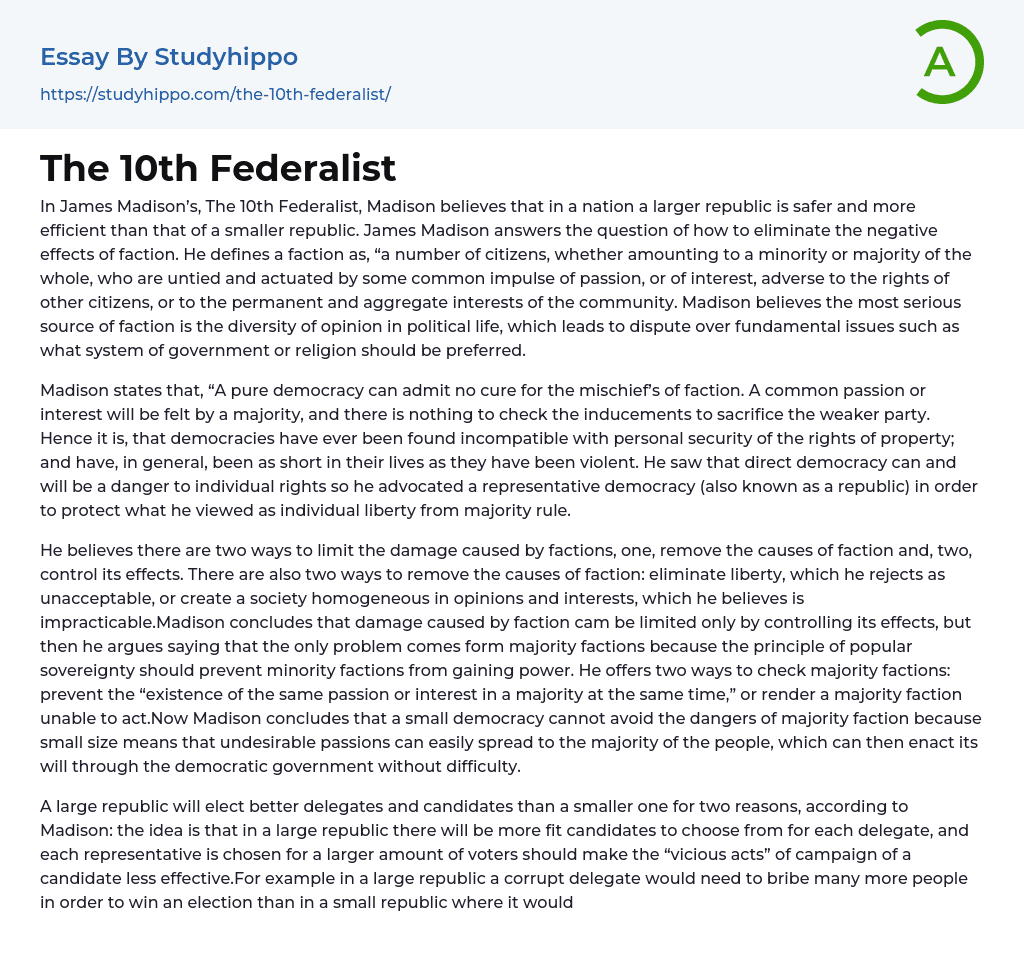According to James Madison's "The 10th Federalist," a larger republic is safer and more efficient than a smaller one. Madison addresses the issue of eliminating the negative consequences of faction, defining it as a group of citizens who act together based on some common passion or interest that is adverse to the rights of other citizens or the long-term interests of the community. Madison believes that diversity of opinion in politics is the primary source of faction, leading to disputes over critical issues such as preferred systems of government or religion.
Madison believed that pure democracy has no remedy for the evils of faction. The majority often acts on common interests and disregards the interests of the minority, putting their rights at risk. As a result, democracies have historically been incompatible with personal security and have been short-lived due to their violent natu
...re. Madison advocated for a representative democracy, also known as a republic, to protect individual liberties from majority rule.
In his analysis, Madison proposes two ways to limit the damage caused by factions: removing their causes or controlling their effects. To remove the causes of faction, he dismisses the option of eliminating liberty and deems creating a society with homogeneous opinions and interests impractical. Madison thus asserts that controlling the effects of faction is the only viable solution. Nonetheless, he acknowledges that the primary issue lies with majority factions, and upholding popular sovereignty is crucial to prevent them from gaining power. He suggests two means to curb majority factions: preventing the same passion or interest from forming in a majority simultaneously or rendering them unable to act. Ultimately, Madison argues that small democracies canno
avoid the dangers of majority factions since undesirable passions can easily spread to the majority and enable them to enact their will through democratic government easily.
Madison argued that a larger republic is preferable to a smaller one for two reasons. Firstly, in a large republic there will be a greater pool of capable candidates for each delegate, providing voters with more choice. Secondly, representatives elected in a large republic are chosen by a larger number of voters, making it more difficult for corrupt candidates to engage in unethical campaign practices. In contrast, in a small republic it is easier for delegates to bribe citizens due to the limited number of voters that need to be targeted. By virtue of their larger size, societies in a large republic will have more diverse parties and interest groups competing against each other. This competition will make it less likely for any single undesirable passion or interest group to gain control of the government as it must span across multiple states before impacting the entire country. Madison believed that by providing more effective governance than individual states could attain on their own, the greater size of the Union is critical.
According to Madison, if the constituencies of federal representatives are too large, those representatives will have insufficient knowledge of local interests and circumstances. However, smaller constituencies of state and local officials will always prioritize local affairs regardless of the size of federal constituencies. Madison concludes that in a sizeable republic like the United States, corrupt factions would face obstacles to effective collaboration and power exercise.
- Business Law essays
- Contract essays
- Consumer Protection essays
- Property essays
- Ownership essays
- Agreement essays
- Common Law essays
- Contract Law essays
- Justice essays
- Security essays
- Tort Law essays
- United States Constitution essays
- Crime essays
- Lawsuit essays
- Treaty essays
- Family Law essays
- Marijuana Legalization essays
- Constitution essays
- War on Drugs essays
- Court essays
- Jury essays
- Police essays
- Protection essays
- Community Policing essays
- Criminal Law essays
- Judge essays
- Lawyer essays
- Employment Law essays
- Copyright Infringement essays
- Injustice essays
- Intellectual Property essays
- Breach Of Contract essays
- Jurisprudence essays
- Social Injustice essays
- Juvenile Justice essays
- Internet Privacy essays
- Cyber Security essays
- Bill Of Rights essays
- Civil Liberties essays
- First Amendment To The United States Constitution essays
- Fourth Amendment To The United States Constitution essays
- Second amendment essays
- Animal Cruelty essays
- Law Enforcement essays
- Juvenile Justice System essays
- Surveillance essays
- Forensic Science essays
- Crime Prevention essays
- Criminal Justice essays
- Criminology essays




